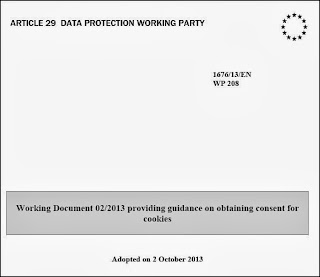A new “working document” from the Article 29 Working Party has plopped into my inbox. If you’re
aiming to design a website that would be legally compliant across all EU member
states, then this 6 page thingy is one to ponder over. I’m not sure why it’s
not called an opinion. Then again, Article 29 Working Party opinions are
generally pretty large documents. How could any decent eurocrat possibly write an
opinion that covered all the views of all the relevant Article 29 working party
members in just 6 pages?
For those
that don’t have the time to read it themselves, this document offers views on precisely
what specific information about cookies should be published on websites, a
reminder that consent needs to be given before cookies are set or read on
websites, views on what sort of active behaviour the consumer must do in order
to show they have consented to them, and a reminder that consumers should (somehow)
be given the choice to accept or reject each cookie.
It goes
without saying that the EU website the Article 29 Working Party’s working document
is posted on does not appear to comply with all these rules. I haven’t yet
found the gizmo that lets me choose precisely which EU cookie may be set on my
laptop. If anyone knows where it is,
please let me know.
What other
opinions are being prepared?
A quick
squint at the agenda for the Working Party’s meeting on 2-3 October indicates
that an opinion on legitimate interests, and advice on the data protection implications of remotely piloted aircraft systems, is on its way.
Mmmmmm. They
could be a fun read.
And also, somewhat intriguingly, work on "PRISM and possible similar intelligence programmes" is being carried out. Given that issues relating to national security are usually beyond the competence of the EU, it will be interesting so see what can be agreed on in this area. I do, however, find myself agreeing with some of Commissioner Reding's remarks back in July: "The fact that the programmes are said to relate to national security does not mean that anything goes. A balance needs to be struck between the policy objective pursued and the impact on fundamental rights. It is a question of proportionality."
And also, somewhat intriguingly, work on "PRISM and possible similar intelligence programmes" is being carried out. Given that issues relating to national security are usually beyond the competence of the EU, it will be interesting so see what can be agreed on in this area. I do, however, find myself agreeing with some of Commissioner Reding's remarks back in July: "The fact that the programmes are said to relate to national security does not mean that anything goes. A balance needs to be struck between the policy objective pursued and the impact on fundamental rights. It is a question of proportionality."
Source:
http://ec.europa.eu/justice/data-protection/article-29/documentation/opinion-recommendation/index_en.htm#h2-1
http://europa.eu/rapid/press-release_SPEECH-13-607_en.htm
http://europa.eu/rapid/press-release_SPEECH-13-607_en.htm
.



